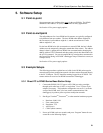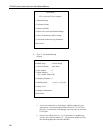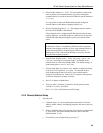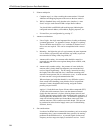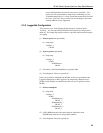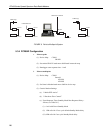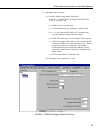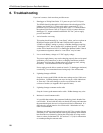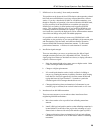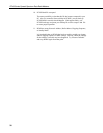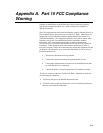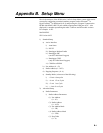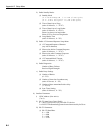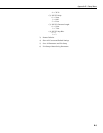
RF400 Series Spread Spectrum Data Radio/Modems
29
7. RF400 receiver “de-sensing” from nearby transmitter
This problem can be observed from LED behavior when operating a hand-
held radio near an RF400 that is receiving collected data from a remote
station. If you key a hand-held 150 MHz or 450 MHz transmitter, even
though its frequency of operation is far removed from the 900 MHz band,
its close proximity to the base RF400 can overwhelm (de-sense) the
RF400 receiver resulting in failed packets and LoggerNet/PC208W
retries. This problem could also occur if you located an RF400 at a site
containing commercial transmitters or repeaters. In general it is best to
avoid such sites, especially the high-power FM or AM transmitter antenna
sites which can change at any time with added equipment.
It is possible to avoid de-sensing in some cases if RF400 link is solid
enough due to: the proximity of your remote RF400(s); high antenna gains
and directionality; high elevation; and sufficient distance separation
between RF400 and commercial transmitter antenna. Try horizontal
polarization of antennas. A field test in such situations is essential.
8. Insufficient signal strength
There are some things you can try to get that extra few dBs of signal
strength sometimes necessary for a dependable RF link. The drop in
signal going from Winter (no deciduous tree leaves) to Spring sometimes
requires a little more signal.
a. Raise the antenna height using a mast, tower or higher terrain. Often
a little extra height makes the difference.
b. Change to a higher gain antenna
c. If in a multi-path situation such as inside a reflective building or
canyon, try pointing the antenna in unlikely directions while looping
back data (see Pass/Fail Appendix K) from the remote RF400 and
typing characters in HyperTerminal. Sometimes a particular
reflected signal will be stronger than the direct wave.
d. Change polarization (element orientation) of all antennas in your
network (yagi or collinear) from vertical to horizontal or vice versa.
9. Interference from 900 MHz transmitter
There are some measures you can take to reduce interference from
neighboring 900 MHz transmitters:
a. Move base station as far as possible from offending transmitter
antenna.
b. Install 9 dBd yagi and position station so that offending transmitter is
located behind or to the side of the yagi to take advantage of yagi’s
front-to-back or front-to-side ratio (back and side signal rejection).
c. Change polarization (element orientation) of all yagi and collinear
antennas in your network to see if that reduces effects of offending
transmitter.



